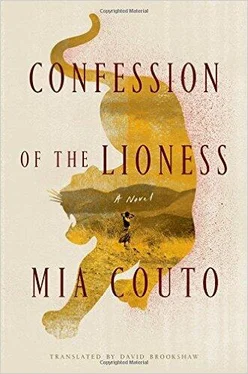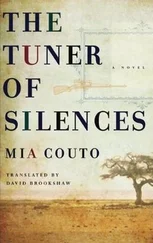Surely that can’t be true!
Her eyes downcast, Luzilia makes a vague gesture, as if the whole thing were a nightmare.
Does he know something? I ask.
What do you mean?
About how I feel for you?
He’s known that for a long time. Roland read your letter to me. He found it in my bag.
How could that be?
I never threw it away.
Roland suspected: My last hunt was a farewell to life. Even if I returned, safe and sound, to the city, I would never return to myself. Madness wasn’t just a simple illness, but a family curse. And only hunting would save me from such a sickly fate.
This was the fear that Roland confessed to Luzilia. In his despair, my brother was handing me a reason to go on clinging to life. This reason was the only woman he had ever loved. I turn my back, in a hurry to get away from the place, when Luzilia stops me:
Archie? Don’t you want to know what I’d like to do?
No. It doesn’t matter anymore. I don’t want you to come, it’s as simple as that. Your place is here, with Roland. Isn’t that what you chose?
Mariamar’s Version: TWO. Return from the River
A woman’s true name is “Yes.” Someone tells her: “You’re not going.” And she says, “I’m staying.” Someone orders: “Don’t talk.” And she’ll remain silent. Someone commands: “Don’t do it.” And she answers: “Very well.”
— A PROVERB FROM SENEGAL
The night before, the order had been issued in our house: The women would remain shut away, far from those who would be arriving. Once again, we were excluded, kept apart, extinguished.
The following morning, I got down to the household chores. I wanted to give my mother a rest, for she had been lying, ever since the early morning, at the entrance to the yard. At one point I lay down next to her, determined to share with her some of the burden of one who feels the weight of her soul. She took no notice of me at first. Then she mumbled between gritted teeth:
This village killed your sister. It killed me. Now it’s never going to kill anyone again.
Please, Mother. We’ve just buried one of our own.
We women have been buried for a long time now. Your father buried me; your grandmother, your great-grandmother, they were all entombed alive.
Hanifa Assulua was right: Without knowing it, maybe I had been buried. So ignorant was I in matters of love, that I had been consigned to the grave. Our village was a living cemetery, only visited by its own residents. I looked at the houses that stretched out along the valley. Discolored, gloomy houses, as if they regretted emerging from the ground. Poor Kulumani, which never wanted to be a village. Poor me, who never wanted to be anything.
Time and again our mother had begged for us to go to the city.
I beseech you, husband, for the sake of all that is sacred: Let us go.
If you want to leave, then go.
We can leave someone to look after the graves.
It’s the other way around, woman: If we leave, the graves will stop looking after us.
* * *
I shook off such memories. What point was there now in dwelling on past bitterness? If we clung so much to the past, how was it that Silência, so recently departed, could cause us to shed tears?
Father complains that yesterday, Mother, you ignored the requirements of those in mourning. Is it true that you offended the spirits?
Let me give you some advice, daughter: When you make love, do it in the river, in the water, as the fish do.
For God’s sake, that isn’t the kind of talk one expects from a mother!
Well, I’m telling you: Making love in the water is much better than in bed.
How do you know?
I watch our neighbor.
The neighbor? She can’t, she’s an out-and-out widow.
Smiling mischievously, she confessed: She would hide along the riverbank, and peer at the neighbor bathing all by herself. Little by little, that woman’s hands would transform themselves into the hands of other creatures, and would strew her body with shivers that she’d never felt before.
Our neighbor taught me how to get my own back on men …
Did I understand what such a confession concealed? Our neighbor only made love to the dead. That’s what Hanifa was telling me. Generation upon generation of the deceased had paraded through our neighbor’s arms. People from afar, blue-blooded people, people who’d never been anything in life: All of them had their passions lit in her liquid bed. From all these lovers, each one chosen by her, the woman only reaped reward: There was no illness, no treachery, no risk of becoming pregnant. All that remained were memories, without ash or seed. Only far from the living could the women of Kulumani have their love reciprocated: That’s what my mother taught me.
Your father’s order is justified. From now on, you’re not leaving the house.
I wasn’t surprised that my father should want me to remain confined. What did puzzle me was the alacrity with which my mother supported her husband’s decision.
That’s exactly what’s going to happen, Mariamar: You’re going to stay here under lock and key.
Then, I began to think: Perhaps I shouldn’t be perplexed by her determination to keep me away from the new arrivals. My mother had not experienced love. The neighbor was the one who’d been blessed: In her rivery bed, she had loved and been loved. Conversely, Hanifa Assulua feared the road, travel, the city. It wasn’t my departure that worried her. It was the scorn that might be leveled at her when no one wanted to take her with them. Other mothers, elsewhere, would have wanted their daughters to flourish out there in the world. But my family had been contaminated by the pettiness that ruled over our village.
Those who came from outside, such as the imminent arrivals, would assume that the inhabitants of the village were good, honest folk. This was an equally honest mistake. The people of Kulumani are welcoming to those who are strangers and come from far-off places. But among themselves, envy and malice prevail. That’s why our grandfather always reminded us:
We don’t need enemies. To be beaten, all we need is ourselves.
* * *
The emptier one’s life, the more it is peopled by those who’ve already gone: the exiled, the insane, the dead. In Kulumani, we all idolize the dead, for in them we preserve the deepest roots of our dreams. The most senior of my dead relatives is Adjiru Kapitamoro. To be precise, he is my mother’s elder brother. In our region, we use the term “grandfather” to describe all our maternal uncles. In fact, Adjiru is the only grandfather I really knew. At home, we called him anakulu , “our eldest.” No one ever knew his age, and not even he had any idea of when he had been born. The truth is that he considered himself so everlasting that he claimed to have created the river that ran through our village.
I’m the one who made this river, the Lundi Lideia , he insisted haughtily.
The list of his fabulous fabrications was a long one: Apart from the river, Grandfather had also fashioned escarpments, chasms, and rain. All thanks to his powerful mintela , the mixtures and charms of the witch doctors. He, however, denied such a grandiose status:
I’m not a witch doctor, I’m just an old man.
In colonial times, his father, the revered Muarimi, had been appointed to the position of captain-major. He collected taxes and settled local disputes in favor of the colonists. This occupation made my great-grandfather the target for blame, envy, and lasting antipathy. But our family gained the name that it now bears proudly: We were the Kapitamoros. In a land without a flag, we hoisted this borrowed insignia as if it were our natural, time-honored right.
Читать дальше












